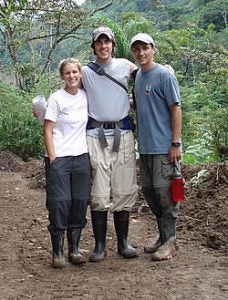First medical humanities summer fellows share Costa Rican experience
GREENVILLE, N.C. (Sept. 7, 2007) — Second-year Brody School of Medicine students Rebecca Keener and Josh McKinnon spent this summer in a remote Costa Rican village exploring indigenous views of illness and spirituality.
Keener and McKinnon, the first Medical Humanities Summer Fellows, shared their experience with students, faculty and staff on Thursday. Through the Medical Humanities Summer Fellowships, students can receive up to $3,000 each to support their exploration of a social or cultural dimension of health care between their first and second years. The talk was the first this semester in the Perspectives Lecture Series sponsored by the ECU Department of

Rebecca Keener, left, and Josh McKinnon, center, explored indigenous views of illness and spirituality in Costa Rica. They are pictured with Dr. Alekcey Murillo, right, a Costa Rican native and their mentor. Contributed photo
Medical Humanities.
Keener and McKinnon conducted interviews with the Cabecars, the largest of three indigenous groups in Costa Rica.
Despite isolated, rugged terrain with no roads and language barriers, Keener and McKinnon traveled long distances to interview 19 families about a common problem: diarrhea. The Cabecars live on the Chirripo reservation and raise their own food and livestock. The area has poor water sources without filtration systems. Hospital or health clinics can be up to 8 hours or more away, and the Cabecars depend on Jawa, or a local healer, for health care needs. Ninety-five percent of those asked said they visit the Jawa when sick.
Homes are isolated and can be an hour or two apart, so sustainability and self-sufficiency are important. While there, Keener and McKinnon met a man who showed them 12 different plant remedies used to stop diarrhea and other illnesses. They also interviewed a Jawa, which they described as the most influential experience of their trip.
“This culture seems to be drenched with connections between the cosmos and prevention of illness,” said McKinnon, who is a Brody Scholar.
Fire is used for cooking as well as keeping away evil spirits. Yet there are no ventilation systems in homes, leading to significant respiratory problems, McKinnon said.
“We learned a lot about public health,” Keener said. In one instance, the two helped dig a ditch to drain water and prevent it from pooling near a structure.
Cultural sensitivity was a difficult concept to apply until Keener and McKinnon got out of the United States, they said. They learned about the importance of relationships, the art of listening and practicing in a holistic manner.
Medical Humanities Summer Fellowship projects are selected on a competitive basis. Students are encouraged to integrate their medical training with their personal interests and experiences. Any aspect of the culture, history or ethics of health care and medical practice may be suitable for a project, which can be performed in the United States or other countries. Faculty will award a maximum of four fellowships each year. Students interested in discussing possible fellowship applications should contact the medical humanities department.